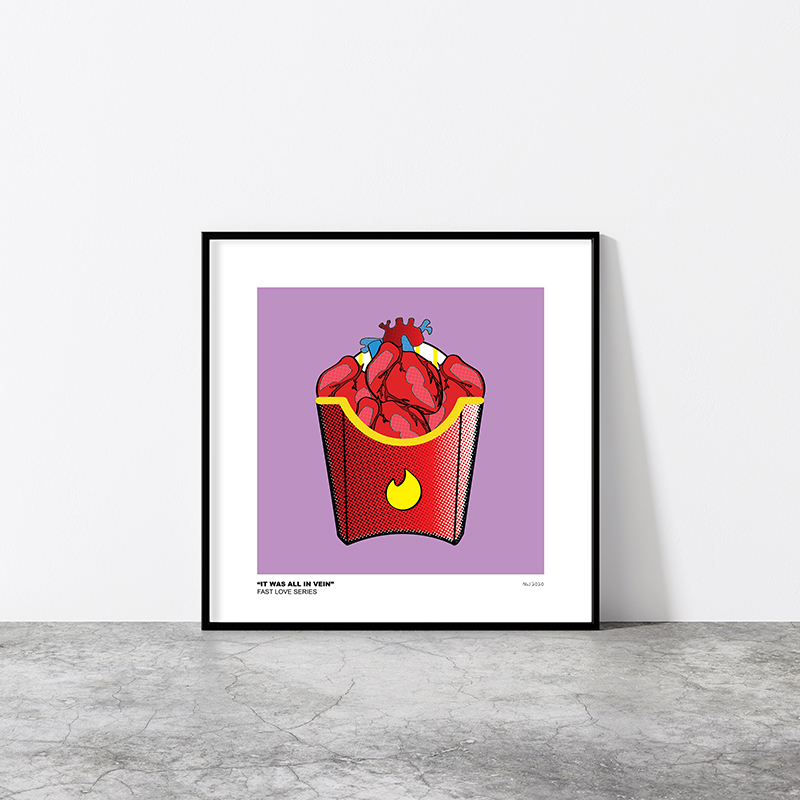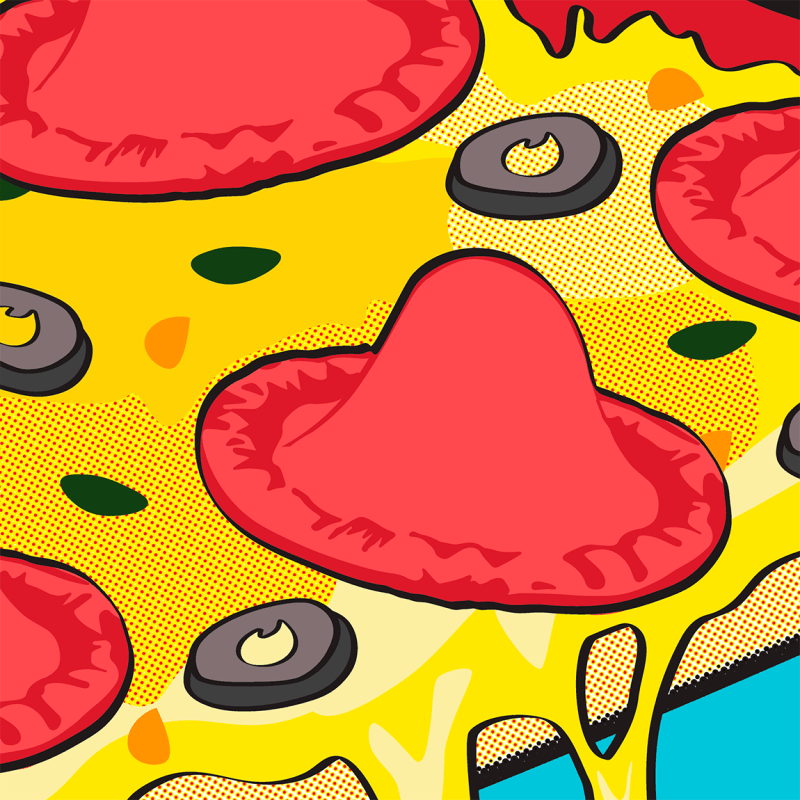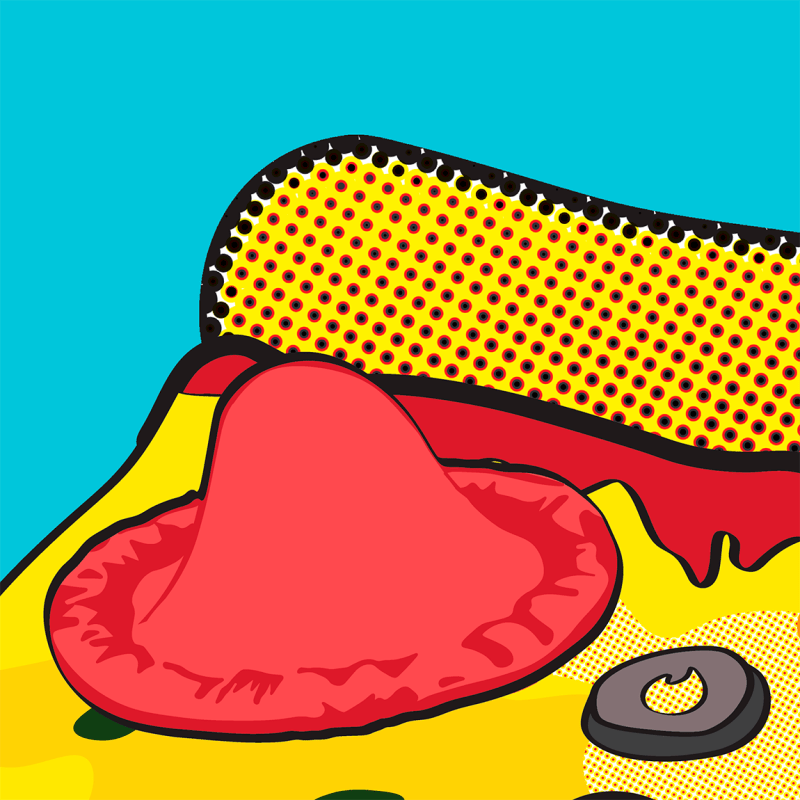Colourful and bold illustrations playfully explore themes of swiping addiction, instant gratification, hookup culture and the paradox of limitless choice.
Mixed-media artist Natalie Wong shares her latest artwork – “Fast Love”, in an exclusive online exhibition (https://www.fastlove.online/). The new series comprises of nine illustrations poking fun at dating apps and their effects on romance and relationships. Visually inspired by the comic book stylings of Roy Lichtenstein, “Fast Love” is a satirical and subversive take on modern mobile swiping culture. The work whimsically blends imagery of iconic fast food staples and intimately human objects, creating a visual parody of contemporary dating culture.
“Although apps have revolutionised the way people connect and are one of the most impactful social disrupters in decades, dating apps have sacrificed romance at the altar of technological efficiency. Whilst the idea of having more choices seem beneficial, it may, in fact, be detrimental to dating. When faced with multiple options, apps make it too easy to discard matches over minor issues because the environment provides a feeling of abundance for better dates.” On the inspiration behind combining fast food staples and dating-related images, Wong shares: “The similarities between the ease of access, disposability, addictive and consumer-orientated nature of fast food heavily lent itself conceptually and made for compelling visual references within the narrative I wanted to explore.”
In “Glazed and Confused”, the illustration initially looks like a strawberry doughnut with sprinkles. On closer inspection, the viewer can see the sugary decorations are in fact multi-coloured pills with dating app logos. “When using dating apps, there is the promise you will match with someone great, and you frequently receive positive reinforcements to keep looking. Swiping can become addictive and users get a continual ‘hit’ of validation each time someone matches with them on the app,” says Wong. In “It Was All in Vein”, the illustration shows the iconic red French fries box with human hearts – implying how dating apps have turned people into cheap commodities and internalised the idea that everyone is readily available for our own personal consumption and enjoyment.
Throughout the series, the artist explores the commodification and devaluation of romance. A central underlying question is posed as to whether the fault lies with technology or with us. “There is a strong argument that dating apps are large capital enterprises which exploit inherently complex human flaws and vulnerabilities. Apps enable our culture’s worst desires for efficiency in a space where individuals, who are looking for genuine connections, most need to resist those impulses,” explains Wong.
Prints from the series are available in a limited edition of 20: https://www.papersneaker.com/online-store.
‘It Was All in Vein’ (2020)
Part of the ‘Fast Love’ Series
‘It Was All in Vein’ reflects the idea that when dating on apps, people form an addiction to consuming and collecting people’s feelings and emotions. People are now seen as commodities, as opposed to individuals. It also implies that technology has internalised the idea that people are readily available for our own personal consumption and enjoyment.
The traditional McDonald’s logo is subverted and replaced with a revised tinder logo. It feels good when you consume someone’s love and affection but after repeatedly doing this with multiple strangers, you may feel physically sick and guilty. The artwork also suggests that acquiring ‘love’ this way is not inherently healthy and is merely a temporary form of satisfaction.




‘I Don’t Want to Taco ‘Bout It’ (2020)
Part of the ‘Fast Love’ Series
Tacos are one of America’s favourite food items and are available everywhere from street corners, fancy restaurants and fast-food chains. But in the context of online dating, tacos have become advertisements for a stranger’s personality. If you use dating apps, you are likely to come across someone saying ‘I’m just here for the tacos’ or ‘I’ll take you to the best taco spot in town’. My belief is that in the modern age of the internet, there is a contemporary and culturally accepted norm to adore snacks. Tacos symbolize a certain type of mildly cultured person who doesn’t take themselves too seriously. Characteristics which prove to be popular traits for both genders.
“Everything we include on our dating apps is a constructed performance … and an explicit endgame (true love or a hookup), and that people are, underneath our hard taco shells, all the same” – Rebecca Jennings.
‘I Don’t Want to Taco ‘Bout It’ depicts a taco with sweetheart candies (also known as conversation hearts). The immediate reaction should be one of distaste and uncomfortable surprise as sugar candies are not normally eaten in a traditionally savoury taco, reflecting the idea that the experience of meeting and talking to hundreds of people is an unconventional cultural shift in human behavior. I substituted the typical words found on these candies with names of men and women to suggest the idea that meeting people on apps have turned individuals to nothing more than homogenous shapes, interchangeable with each other. After weeks or months of swiping, everyone becomes the same. The tinder logo is disguised within the taco’s texture, implying the presence of the dating platform wrapped around and containing all the people you match with.




‘Instant Connection’ (2020)
Part of the ‘Fast Love’ Series
‘Instant Connection’ plays with the packaging of the branded food staple by replacing the Nissin Ramen Boy (usually featured solo), with a female companion. The chopsticks are shown to hold a pair of wedding rings and the flavour is labeled as ‘human’. The work presents the idea that dating apps sell the goal of long-term companionship that can be accessed, made and produced rapidly and with ease.
With instant ramen, the fast-food product has eliminated the need for advanced culinary skills and shortened the time required to prepare a meal. In comparison to dating, if individuals were to meet potential dates in the traditional sense, it could take hours and require a developed level of social skill. Now, dating apps have diluted these requirements. Additionally, it is inconsequential that chemistry is not developed during early conversations because apps provide efficient opportunities to meet someone else.
The interesting question here is – are people in trouble of always searching for the ‘better’ option because it has become so inherently easy to dismiss a conversation if it goes south? Do dating apps just perpetuate swiping and never actually finding?




‘Glazed and Confused’ (2020)
Part of the ‘Fast Love’ Series
At first glance, the viewer will see a strawberry glazed doughnut with multi-coloured sprinkles.
On a closer study, the viewer will notice that the sprinkles are, in fact, various drugs and pills. Additionally, the circular tablets are branded with a logo of the dating app, Happn. In ‘Glazed and Confused’, the artwork explores themes of swiping addiction and instant gratification.
“Dating apps are basically slot machines – there’s the promise that you’re going to find something good, and every once in a while you get a little positive reinforcement to keep going.” – David Greenfield.
As people swipe, frequent matches and inviting messages to provide a mini-hit of dopamine to the brain that keeps people coming back for more. The artwork’s underlying message is that for many singles on the dating scene, the act of swiping has become an addiction because they know a match or alike is guaranteed and human brains thrive on intermittent variable rewards.




‘Matrimony and Sleaze’ (2020)
Part of the ‘Fast Love’ Series
The words ‘Matrimony and Sleaze’ is a word-play substitute for the famous fast food name on the blue box. An eggplant emoji, a common symbol used in online chats about sex and male genitalia replaces the traditional macaroni shape on the front.
Although an oft-cited benefit of dating apps is access to a greater number of dating options – in reality, this benefit also has negative side-effects. With infinite match options, individuals cannot decide who to talk to and when they do decide, they may be less satisfied with their choices. There is a hidden illusion of abundance. It can be argued that apps do not deliver relationships but rather the sensation that there is a possibility of one.
Kraft Heinz is a billion-dollar company and the decision to present artwork referencing one of their iconic products also implies the commodification and capital enterprise behind the dating app apparatus. Unique to this artwork, pricing is included (similar to some packaging on Kraft’s Mac and Cheese products).
On many apps, subscription add-ons provide participants with better choices, more matches and a potentially better dating experience which is charged at a premium. As a business model, the core aim of dating apps is to encourage more people to pay for their services and to keep returning to their app.
But, if a company’s goal is to convert individuals from being free users to paying subscribers, are its algorithms really designed in their best interest? Ultimately, there is a fundamental conflict of interest between the user and the designer of the app.




‘More Pepperoni Please!’ (2020)
Part of the ‘Fast Love’ Series
“Pizza and Sex. Sex and Pizza. They’re two wonderful things are pretty good even when they’re not that great.” – Jeremy Glass.
In ‘More Pepperoni Please!’, there is the conspicuous connection between male genitalia, condoms and pepperoni. The cut olives have tinder logo-shaped depressions at their centres and the dripping of the cheese is also mildly suggestive.
Dating apps have been the biggest contributors to the growth of hook-up culture in the modern age. This work makes the most explicit connection between sex and fast-food within the series. The visual references within the work imply both the gustatory satisfaction of both the sexual experience and in the consumption of food, but also that they are both pleasurable and sell the idea of ‘guilt-free indulgences’ for casual sex or fast food cravings.
The appetite for sex has always existed, but it had controlled availability; with technology, the limitations are being chipped away and we see people going into overdrive with it. The same thing is happening with unfettered access to sex partners. People are gorging and developing a form of psychosexual obesity.




‘Swipe Fresh!’ (2020)
Part of the ‘Fast Love’ Series
‘Swipe Fresh’ plays on Subway’s ‘Eat Fresh’ slogan which helped promote the idea of being a healthy alternative and aligning the brand with growing consumer interest in the transparency of ingredients.
Whilst there is a developed understanding for healthy eating, the artwork explores the common situation where most dating app users felt a noticeable lack of transparency from the people they met with. It is ironic that society has more transparency in the food we consume than with the people we invite to share our lives with.
In ‘Swipe Fresh’, the usual condiments found in a standard sandwich are replaced by unusual items – the sliced tomatoes are replaced with condoms; the lettuce with money; the red onion slices with tinder logos and the meat with female contraceptive pill packets. The cheese and ham slices could be seen as intended or as discarded bits of clothing. This image evokes the idea that app dating is a predominantly sex-orientated facilitator that relies on individuals to spend money to consume and satisfy their needs.




‘Taste the Feeling!’ (2020)
Part of the ‘Fast Love’ Series
Similar to ‘Swipe Fresh!’, ‘Taste the Feeling!’ is a direct reference to Coca-Cola’s 2016 campaign which aimed to combat the trend of declining soft drink sales following consumers’ health concerns about sugary drinks. The slogan was based on a core message: “The simple pleasure of drinking Coca-Cola makes the moment more special.”
Unlike the other works in the series, this artwork intentionally omits any visual reference to any one particular dating app. This was done to highlight the idea that its critique applies to the dating app industry in general. Coca-Cola’s label is used as the focus point to demonstrate the negative side-effects many experiences whilst dating online. Labels in themselves are a construct within romantic relationships as they are used to define where each person is in the relationship, their expectations and desires.
The words in this artwork are direct statements as to the undesirable consequences both genders may experience and encourages the viewer to question whether the hours spent swiping is inherently a valuable use of time and a beneficial experience in the long term.
‘Taste the Feeling!’ poses further questions. Namely, if individuals are fatigued by apps, or have unfulfilling experiences on them — should they stop swiping if it makes them unhappy or do they keep trying it? If people are discouraged when they use apps, the question is: is it technology’s fault, or is it ours? Are dating apps mentally draining because of integral issues with the apps? Or, is it because dating has always been an exhausting enterprise?




‘Thirsty!’ (2020)
Part of the ‘Fast Love’ Series
In ‘Thirsty’, I substituted the famous logo and slogan with the bumble hive icon and ‘I’m Lustin’ it’. The ‘Thirsty Fun’ words on the front do actually appear on some versions of the plastic cup. I kept it to maintain the double-meaning within the context of the work and the act of drinking soda. The liquid graphic at the bottom was an addition that is also mildly suggestive.
Although dating apps are old news and have become a normal way to look for love and sex, the question is how well do they work and are the effective and enjoyable to use? Naturally, results vary depending on what people want – to hook up or have casual sex, to date casually or date as a way to actively look for a relationship. The group who appears to be most struggling are those who are trying to find relationships. A lot of women using apps are experiencing a phenomenon known as ‘dating fatigue’ or ‘dating exhaustion’, which is at odds with the expectation that swiping is so easy and efficient and definitely not within the description of being ‘fun’.
When you use a resource more efficiently, you ultimately use up more of it. As food has become cheaper and more convenient—more efficient to obtain—people have been eating more. On dating apps, the resource is people. You go through them just about as efficiently as possible, as fast as your thumb can swipe, so you use up more romantic possibilities more quickly. So, you end up spending a little effort on a lot of people, and this is where the burnout comes from. Because it adds up to feel like you’ve done a lot of work, but you’re still left with nothing. Which invariably, does not really sound like so much fun.




About the Artist
Natalie Wong lives and works between Hong Kong and London. Wong’s main creative practice is divided between commercial projects and her own fine art. Her previous commercial collaborations include NIKE, Victoria’s Secret, KFC, Astrazeneca, and Monster Energy Drink. Wong has exhibited internationally in major cities including Hong Kong, London and Johannesburg.
Contact Information:
Email Address: [email protected]
Instagram: @papersneaker
Website: www.papersneaker.com


